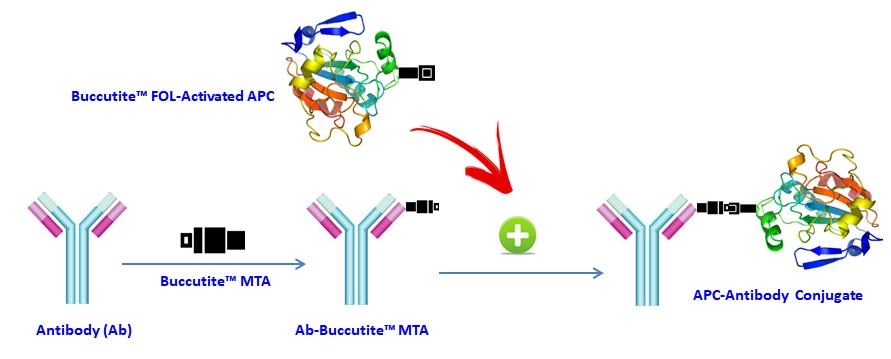ReadiUse™ Preactivated APC
Allophycocyanin (APC) is a phycobiliprotein isolated from Spirulina sp., a blue-green alga. Like other phycobiliproteins, APC is fluorescent, with an extremely high absorptivity and a high quantum efficiency. It is a protein which can be easily linked to antibodies and other proteins by conventional protein cross-linking techniques without altering its spectral characteristics. AAT Bioquest offers this preactivated APC to facilitate the APC conjugations to antibodies and other proteins such as streptavidin and other secondary reagents. Our preactivated APC is ready to conjugate, giving much higher yield than the conventionally tedious SMCC-based conjugation chemistry. In addition, our preactivated APC is conjugated to a protein via its amino group that is abundant in proteins while SMCC chemistry targets the thiol group that has to be regenerated by the reduction of antibodies.


| Catalog | Size | Price | Quantity |
|---|---|---|---|
| 2561 | 1 mg | Price |
Physical properties
| Solvent | Water |
Spectral properties
| Correction factor (280 nm) | 0.195 |
| Extinction coefficient (cm -1 M -1) | 730000 |
| Excitation (nm) | 651 |
| Emission (nm) | 660 |
Storage, safety and handling
| H-phrase | H303, H313, H333 |
| Hazard symbol | XN |
| Intended use | Research Use Only (RUO) |
| R-phrase | R20, R21, R22 |
| Storage | Refrigerated (2-8 °C); Minimize light exposure |
| UNSPSC | 12171501 |
Contact us
| Telephone | |
| Fax | |
| sales@aatbio.com | |
| International | See distributors |
| Bulk request | Inquire |
| Custom size | Inquire |
| Technical Support | Contact us |
| Request quotation | Request |
| Purchase order | Send to sales@aatbio.com |
| Shipping | Standard overnight for United States, inquire for international |
Page updated on February 27, 2026

